
Art Gharana — 8 Mins read
How to Learn Music at Home?
Music
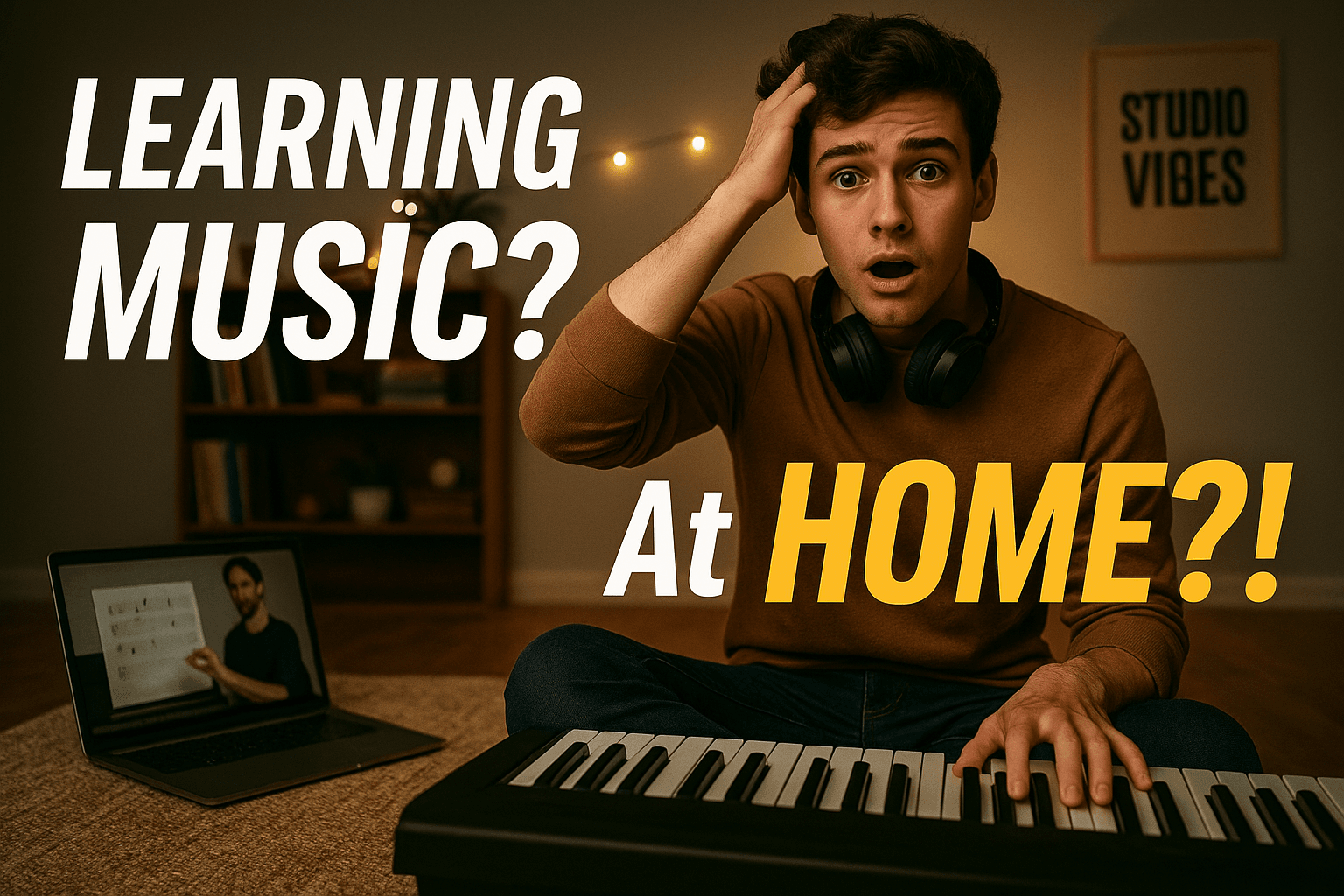
Have you ever wondered how to learn music from the comfort of your home—without stepping into a traditional classroom or studio? Whether you're a complete beginner or someone rediscovering your passion, learning music at home is more accessible and exciting than ever. With the right tools, guidance, and mindset, your living room can become your personal music class for beginners.
In today’s digital age, learning music online offers flexibility, personalization, and convenience. You no longer need to ask, “How do I learn music?”—because the answers are at your fingertips. From understanding the basics of music theory to exploring your favorite instrument or vocal style, at-home learning lets you shape your musical journey on your terms.
But where do you begin? What do you need? And how can you make sure you’re learning the right way? This blog walks you through everything—from beginner music tips to finding the best platforms and teachers—so you can confidently step into the world of in home music lessons. Ready to turn your passion into practice? Let’s dive in.
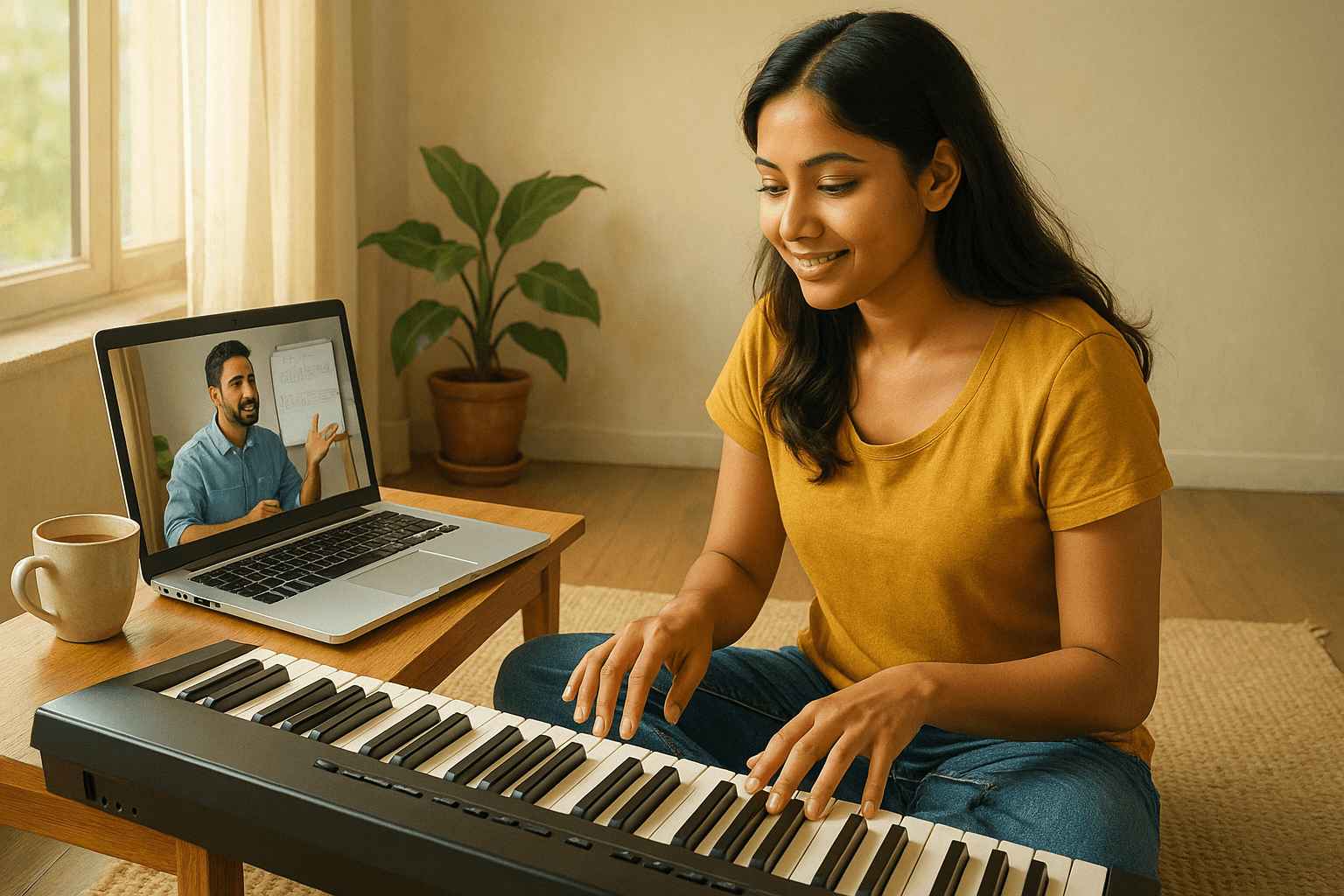
Ever caught yourself humming a tune and thinking, “I wish I could actually learn music”? You’re not alone. Many aspiring musicians wonder how to take that first step—especially when juggling work, school, or a busy home life. The good news? Learning music at home isn't just possible; it’s powerful.
Here’s why home-based music learning is becoming the preferred choice for students of all ages:
Life can be unpredictable—but your music education doesn’t have to be. One of the biggest advantages of in home music lessons is the freedom to learn on your schedule.
With learn music online platforms, you're not bound to rigid time slots, making learning feel natural—not like a chore.
Let’s face it—your home is your comfort zone. And when you're at ease, you learn better. Whether you're working on beginning music lessons or refining techniques, being in a familiar setting boosts confidence and creativity.
Plus, at home, there's no pressure of performing in front of a classroom. You can make mistakes, laugh at them, and grow—at your own pace.
Gone are the days when quality music education was limited to city dwellers or conservatory students. With today’s tech and platforms like Art Gharana, you can learn from passionate, professional teachers no matter where you live.
You gain:
Start right where you are—with a phone, internet, and the desire to grow. Whether you're into beginner music, exploring how to study music, or just love the idea of making music at your own pace, learning at home opens doors you didn’t know existed.
Let your journey begin today. It’s not about having the perfect setup—it’s about taking the first step.
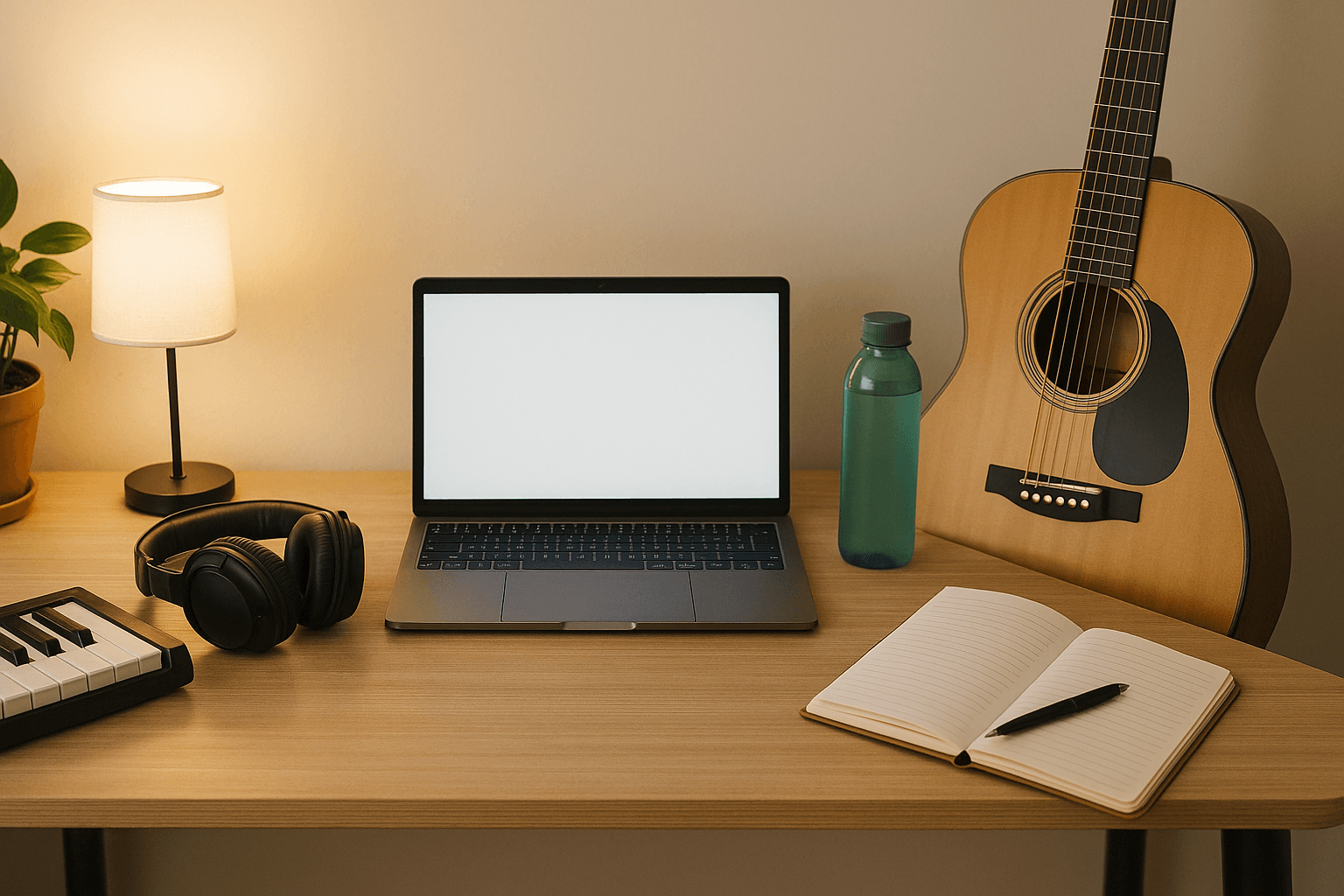
So, you’re ready to begin your music journey from home—but what exactly do you need to get started? Contrary to popular belief, you don’t need a fancy studio or expensive gear. With the right mindset and a few basic tools, your home can become the perfect space for immersive music lessons for beginners.
The first step is deciding what you want to learn. Do you dream of strumming a guitar, singing classical ragas, or tapping piano keys?
Ask yourself:
Whether it’s a keyboard, flute, or your own voice, choose something that excites you. Need inspiration? Explore Art Gharana’s instruments courses or vocal programs to find what fits your passion.
To make the most of your at home music experience, ensure you have a few basics:
These tools enhance interaction and help you receive real-time feedback from your instructors.
Bonus Tip: Choose a chair that supports your posture—it makes a bigger difference than you might think!
Consistency in practice starts with having your own creative zone. It doesn’t need to be a large room—just a quiet corner where distractions are minimal.
Set the mood:
When your environment supports focus, your practice naturally becomes more effective and enjoyable.
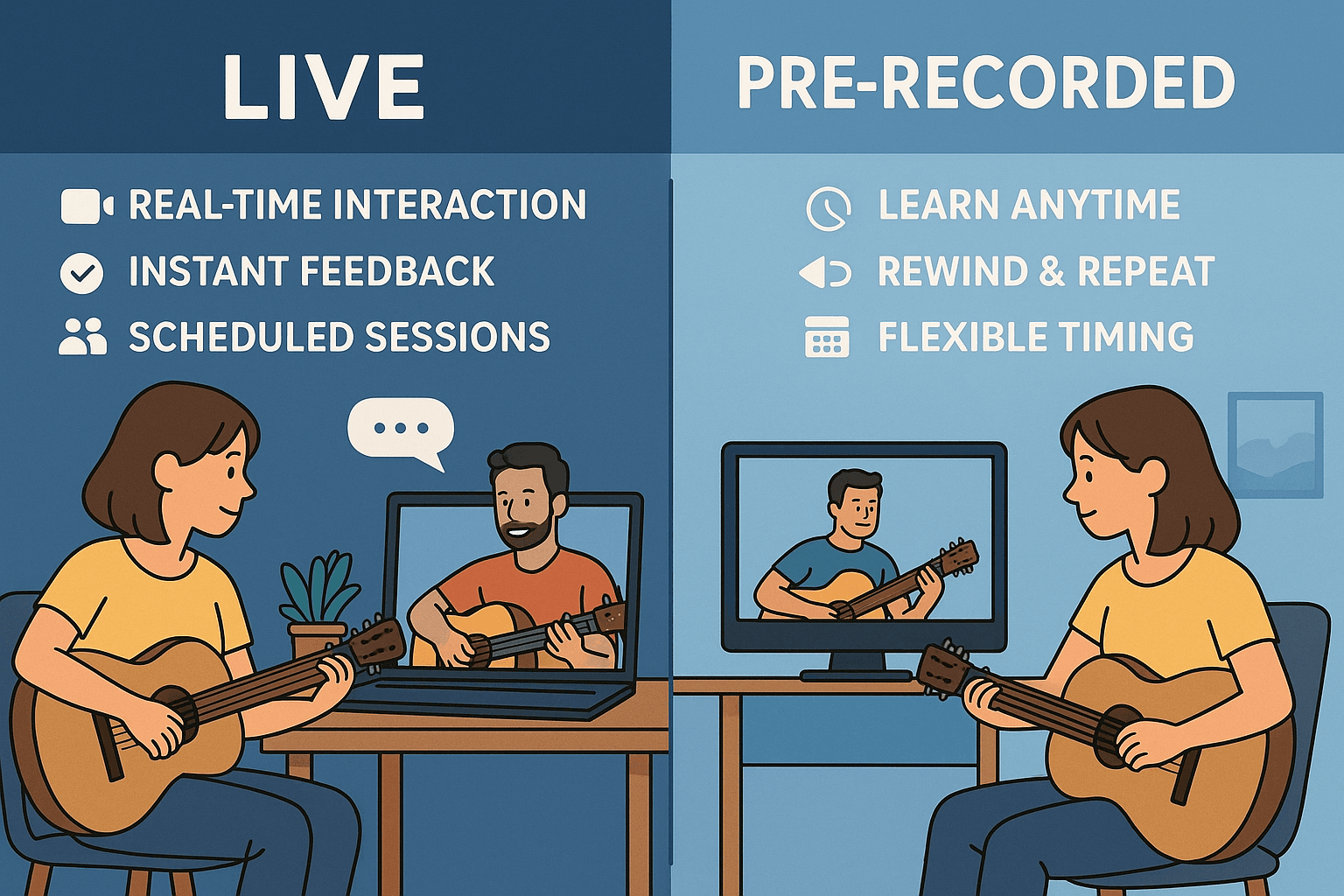
When it comes to learning music online, there’s no one-size-fits-all approach. The beauty of digital learning is that you get to choose how, when, and what you want to study. But with so many options out there, it’s easy to feel overwhelmed.
So how do you pick the right method for your goals, pace, and lifestyle? Let’s break it down.
One of the first choices you'll make is between live virtual classes and pre-recorded video lessons. Both have unique benefits:
Live Classes:
Pre-recorded Lessons:
If you're someone who thrives on structure and guidance, live sessions might be perfect. You can even book a free trial class with Art Gharana to see how it feels. On the other hand, if you prefer flexibility and repetition, go for pre-recorded modules that let you revisit each concept as often as you need.
Another important decision: how much guidance do you want?
Self-paced courses work well if you're self-motivated and enjoy exploring music theory or learning music notes on your own.
Instructor-led programs, like those offered at Art Gharana, provide structured progression and expert mentorship, which is especially helpful when you’re starting out with beginner music or diving into the making of music.
Music is meant to be shared, and learning in isolation can sometimes feel uninspiring. That’s where community-based learning shines.
Look for platforms that offer:
This sense of belonging keeps motivation high and allows you to grow not just as a learner, but as a performer.
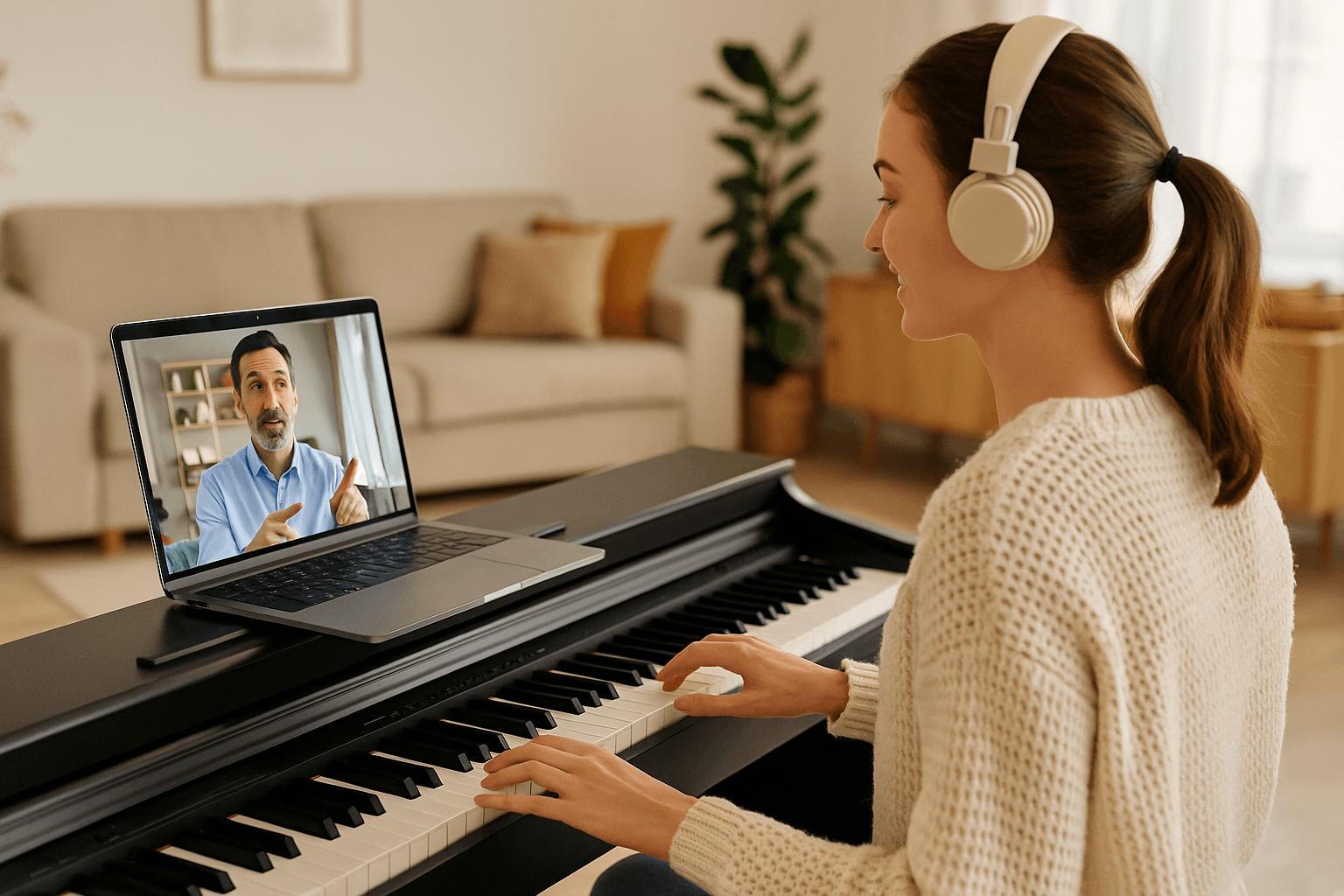
One of the most important factors in your at-home music learning journey is having the right teacher. You might have the best books, gear, and apps—but without an instructor who understands your pace and style, progress can feel frustrating. So how do you find the right mentor when learning music online?
Here’s a smart approach to choosing the perfect music teacher from the comfort of your home.
Not all music teachers are created equal. Some are brilliant performers but may not know how to teach beginners. Others might be great with kids but not ideal for adult learners.
Ask yourself:
Browse the Art Gharana Teachers page to explore professional instructors with diverse specializations in vocal, instrumental, and music theory education.
Everyone learns differently. Some people prefer a relaxed, nurturing approach, while others thrive with structure and discipline. The right teacher adapts to your needs—not the other way around.
A few things to look for:
Want to get a feel for their style before committing? You can book a free trial class and see how the chemistry works between you and your prospective teacher.
A great online music teacher doesn’t just “check in” during class—they guide your journey consistently.
Good mentors will:
They’re invested in your progress, not just your presence.
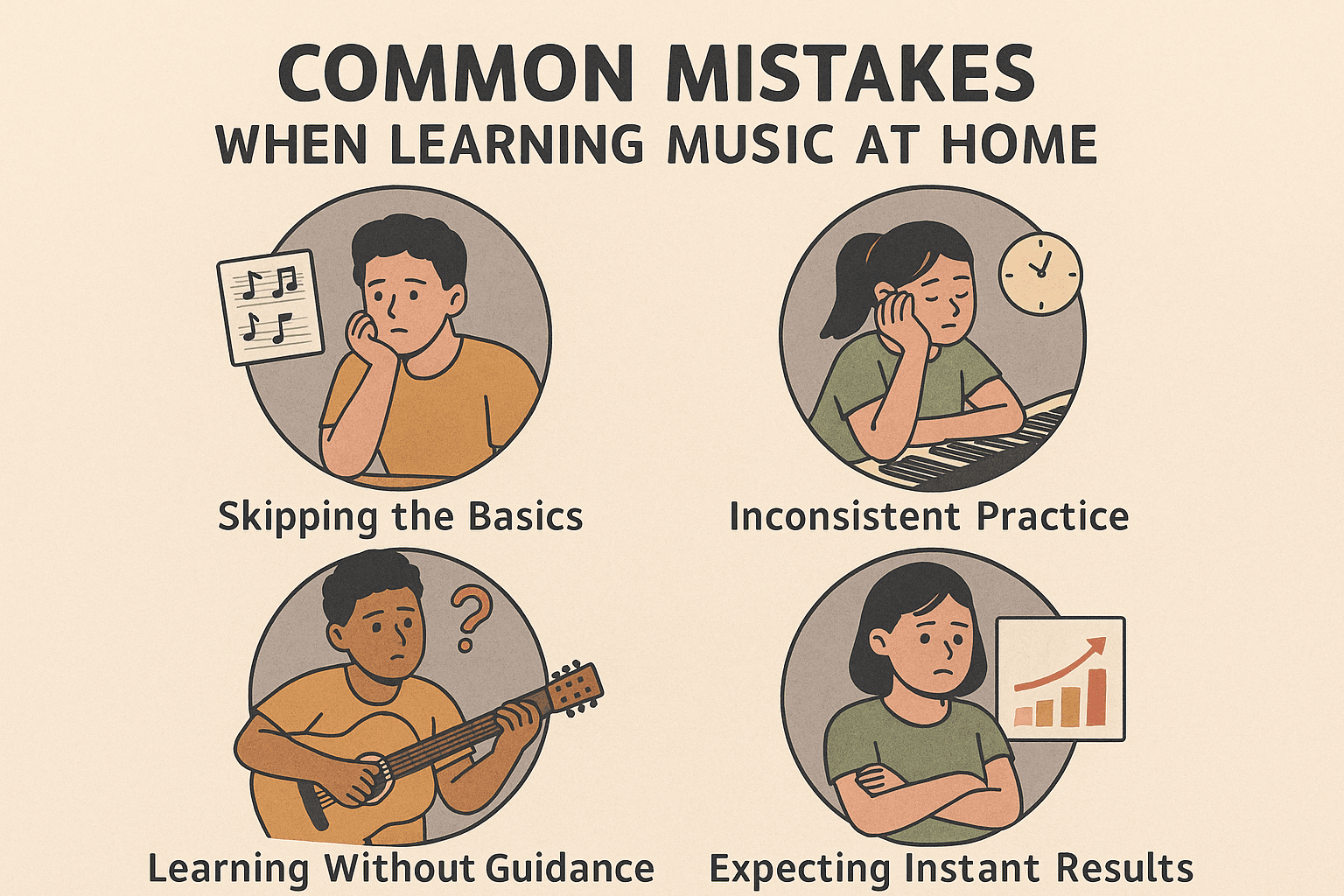
Learning music at home opens up a world of freedom and flexibility—but it also comes with its own set of challenges. Whether you’re just beginning your journey or exploring music lessons for adults beginners, knowing what not to do is just as important as learning what to do.
Let’s break down some of the most common mistakes new learners make and how you can avoid them to ensure smooth, enjoyable progress.
It’s tempting to jump straight into playing your favorite songs. But skipping over the beginning music theory or ignoring how to read learning music notes can lead to confusion and frustration later.
What you should do instead:
These basics are your toolkit—once you master them, learning any style of music becomes easier and more fun.
You’ve heard it before: consistency is key. Practicing for 5–10 minutes every day is far more effective than doing an hour once a week.
Avoid:
Instead:
Small daily efforts add up to real skill over time.
With so many free resources online, it’s easy to think you can do it all alone. But without feedback, it’s hard to know if you’re improving—or reinforcing bad habits.
Avoid:
Do this instead:
A great teacher will correct mistakes before they become habits.
Music is a skill, and like any skill, it takes time. Expecting to master an instrument in a few weeks only sets you up for disappointment.
Remember:
Think of learning music as a long-term relationship, not a weekend crash course.
Avoiding these common pitfalls not only saves you time and effort but also keeps your motivation high. And with support from dedicated mentors and structured learning, your music journey from home can be deeply rewarding.
Ready to avoid the guesswork and get real results? Start learning the right way with guidance from the Art Gharana team — and keep your music dreams moving forward.